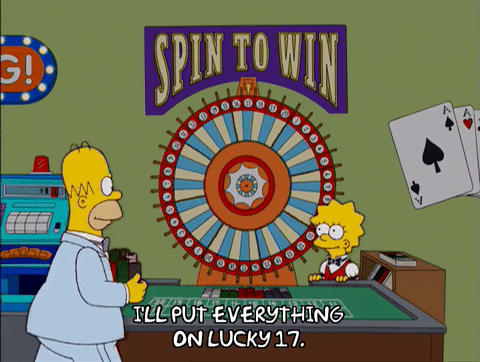
0 result
After a roughly ten-year hiatus, I visited Las Vegas twice in October — once for a football game and another time for Money 20/20, a fintech conference.
As a statistics nerd, the screens by the roulette wheels always make me chuckle. They’ll show the last 20 or so numbers that came up; some screens will even show more statistics about the latest spins, like the frequency of black vs. red. You’ll often hear people talk about lucky numbers and being “hot.”

But we all know the roulette wheel has no memory! It’s completely governed by chance. Each spin of the wheel is independent of the previous spins. The previous frequency of black, red (or anything for that matter) has no bearing on the next spin. But humans can’t help themselves.
We constantly see patterns where there are none. In statistics, this is called a type-1 error, or a false positive. In order to guard against false positives we need to ask ourselves how the results we are seeing compare to what we would expect from chance alone.
In roulette, the odds of getting ten color bets in a row correct are just one in 1,758. If you started betting with $10 and won ten times in a row, you’ll end up with $10,240! The chances are low, but they’re not zero. In fact, if just 10,000 people played roulette for ten spins, you’d expect ~6 of them to win 10 times in a row just by chance alone.

Would you anoint the six as especially skilled at roulette and entrust your life savings to them to bet on the next spin? Of course not, the result was due to luck and we know it, because it’s just a wheel and a ball. There is no skill, strategy, or magic involved.
Annie Duke, a poker champion and author, notes that professional card players call the focus on what just occurred “resulting.” The problem with this approach, as she explains in her book, is that “‘resulting’ assumes “the quality of the outcome tells you about the quality of the decision-making,” but it doesn’t.
Evaluating decisions based on results is very tempting but it can be a bad idea! You should evaluate decisions rationally based on the ex-ante probabilities not the ex-post outcomes.
The lucky roulette player that hit ten bets in a row made a poor financial decision to play a game with less than a 50% chance of winning. The fact that they happened to win ten times in a row is irrelevant.
We see this hindsight bias all the time in sports. If a player takes a low-percentage, off-balance shot in basketball and it goes in, many are tempted to view that as a good decision. Conversely, if it doesn’t go in, many are tempted to view it as a bad decision. Which is it? Should you scold the player for making a bad decision or praise him for taking a “gutsy shot”?
‘Resulting’ says that the quality of the outcome is irrelevant to the quality of the decision, so you should evaluate the shot as a bad decision regardless of whether it went in or not.
‘Resulting’ can lead us into other biases and errors.
These errors and biases show up frequently in pop books about business, self improvement, politics, and other areas. The basic premise of many of these books is to take some successful cohort of companies, people, schools, countries, etc. (i.e. ‘resulting’) and mine that cohort for common characteristics.

Using a tremendous feat of hindsight bias and survivorship bias, the author then concludes that it is those characteristics identified as common among the successful that determine success. All you have to do is model yourself after them and you’re virtually guaranteed to do the same!
The problem is that the author never examines the cohorts that fail to see if they share the same ex-ante characteristics with those that succeed. Perhaps both the successful company and the unsuccessful company had visionary leadership and a detailed execution plan. We’ll never know because the authors are engaged in ‘resulting’ and the failures are not examined.
The focus on outcome, rather than process, is prevalent everywhere, especially in finance and investing. I think it’s because people don’t really understand the range of outcomes and the probabilities of those outcomes.
This leads many people to believe the common trope that “the stock market is no different than a casino.” But it is different! In a casino, the odds of every game are AGAINST you. In the stock market, you can choose to play games that stack the odds against you, or you can choose to play different games, where the odds are in your favor.
For example, picking individual stocks in a concentrated portfolio stacks the odds against you for the simple reason that MOST stocks don’t outperform the overall market. But the overall market tends to go up more often than not, the odds are in your favor.
This year, you may be kicking yourself for owning big positions in Meta or Netflix stock (down ~70% and ~50% respectively, year-to-date). And you should be kicking yourself, but not because they’re down, but because you played a game (stock picking) where the odds are against you.

Whether you won or lost this year on your stock picks doesn’t tell you much about the quality of the decision, the decision to concentrate your portfolio, regardless of result, was the poor one.
Ultimately, a concentrated portfolio widens the range of possible outcomes, but doesn’t put the odds in your favor. A diversified portfolio is a far more reliable way to produce returns. It’s far less hectic too, as the ups and downs are smoothed out by diversification. The downside is a diversified portfolio can be kind of boring! I was going to insert a quote here about how “good investing” should be boring, but there were too many to choose from!
At Secfi, many of our clients get plenty of financial excitement from their startups. And, to me, it makes more sense to take big swings where you personally can have some influence on the outcome, rather than punting on a stock.
When building portfolios, we complement our client’s concentrated start-up exposure with a portfolio of diversified investments that skews the odds of success and outperformance in their favor.
The first step in the process is often to help startup employees understand their start-up equity and make the best decision possible with that equity. Then, we build a custom portfolio that complements that position,and their individual situation and goals. The purpose of the liquid, diversified investment portfolio is to facilitate their ability to shoot for the moon elsewhere, like in their employment at a startup.
Lest you think we are unfeeling robots, we also understand that picking stocks or making other bets in your portfolio can be lots of fun, even if it’s not the most rational thing to do based on the evidence. The important point is to realize why you’re doing it (entertainment), and how to size it. As advisors, we take our fiduciary responsibility seriously and help our clients understand when the odds are against them and how to size their bets when they really want to place them.
At the end of the day, you can’t really completely separate results from process. Ultimately, we focus on the process because it leads to better long-term results. The trick is knowing how and putting in the effort to make it so. The stock market CAN be a casino if you treat it like one, it can also be a powerful compounder of wealth for those who use it appropriately and stick with it.
Things we’re digging:
🔥 The 15 funds that have managed to lose the most money over the last decade, even in a bull market
🛏️ Twitter is installing bedrooms at its newly-emptied offices
🦝 Raccoons get a reputation makeover
🏠 Prediction: Next year, home sales could fall to their lowest level since 2011
🤖 Why ChatGPT is so mind-blowing
-
Secfi Wealth is a brand name for investment advisory products and services, including financial planning and investment management, offered by Secfi Advisory Limited exclusively to Clients under an in-force Agreement. Secfi Advisory Limited is an SEC-registered investment adviser and is a separately managed, wholly-owned subsidiary of Secfi, Inc.